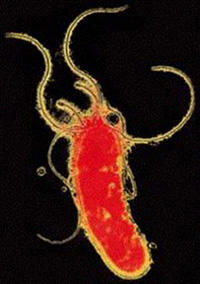ABSOLUTE PROOF THAT THE "INTELLIGENT DESIGNER" COULDN'T TELL FROM ADAM'S OFF OX
As scientists got to know the global variation of Helicobacter better, they began to discover a remarkable pattern. They mapped out an evolutionary tree of the strains of the bacteria and found that it lined up very well with the migrations of humans over the past 50,000 years. One study looked at the Ladakh province of northern India. Muslims and Buddhists have coexisted there for 1000 but remain isolated from one another. It turns out that Muslim Ladakhs only carry a European strain of Helicobacter, while Buddhists carry a mix of European and East Asian bugs. In Peru, Indians who have lived in relative isolation from European colonists carry Helicobacter that is akin to the bugs in East Asia, a major source of migration into the New World. Peruvians from the cities, on the other hand, carried European Helicobacter. It appears that Helicobacter existed in our species before humans began to move beyond Africa, and was then carried around the world as our ancestors traveled the globe. But exactly how long ago this parasite first made its home in us remains to be discovered. . . .
Scientists have a long way to go in order to understand the full evolutionary story of Helicobacter. Many ethnic groups have yet to be sampled, and the evolutionary contortions of their bacteria have yet to be documented. This work promises to offer some guidance about what we should do about this remarkable bug. Antibiotics can wipe it out, but that doesn't necessarily mean we should eradicate it from our species. It produces some proteins that kill other microbes, and one study suggested that it reduces the chances of children getting diarrhoea. Other studies have suggested that while Helicobacter causes some kinds of cancer, not having it increases the chances of other kinds. It's possible that a long coevolution has made Helicobacter part parasite, part mutualist--much the same as intestinal worms may have prevented our ancestors from getting allergies. It's even possible that Helicobacter's high-speed evolution allowed it to become more parasitic in some parts of the world and more mutualistic in others. Before we decide on its future, it will serve us well to understand Helicobacter's past.













No comments:
Post a Comment